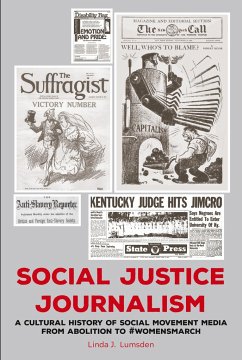Social Justice Journalism: A Cultural History of Social Movement Media from Abolition to #womensmarch argues that to better understand the evolution, impact, and future of digital social justice media we need to understand their connections to a venerable print culture of dissent. This cultural history seeks to deepen and contextualize knowledge about digital activist journalism by training the lens of social movement theory back on the nearly forgotten role of eight twentieth-century American social justice journals in effecting significant social change. The book deliberately conflates "social movement media" with newer and broader conceptions of "social justice journalism" to highlight changing definitions of journalism in the digital era. It uses framing theory, social movement theory, and theories about the power of facts and emotion in storytelling to show how social movement media practice journalism to mobilize collective action for their cause. After tracing the evolution and functions of each social justice movement's print culture, each chapter concludes with a comparison to its online counterparts to illuminate links with digital media. The book concludes that digital activist journalism, while in some ways unique, also shares continuities and commonalities with its print predecessors.
"Ever since Linda J. Lumsden's incisive biography of Inez Milholland, I have been reading everything she writes. Social Justice Journalism is no exception. Lumsden draws a clear, straight line from the social justice journals of the early twentieth century to the digital social movement advocacy of today that, like its print predecessors, often meets the high journalistic standard of verification." -Brooke Kroeger, NYU Arthur L. Carter Journalism Institute, author of The Suffragents: How Women Used Men to Get the Vote; Nellie Bly; and Undercover Reporting: The Truth About Deception








